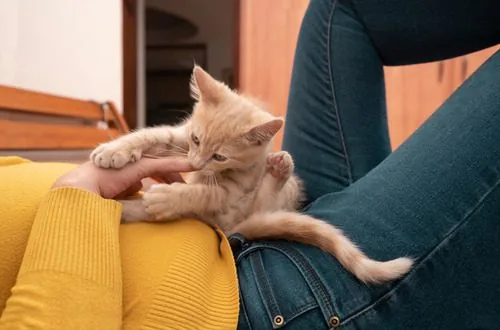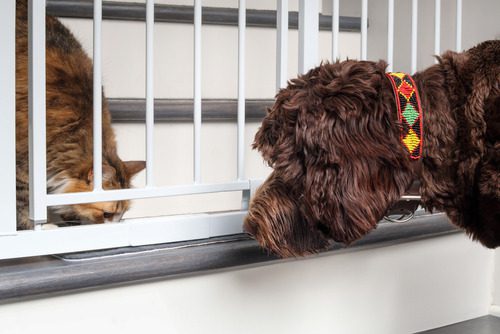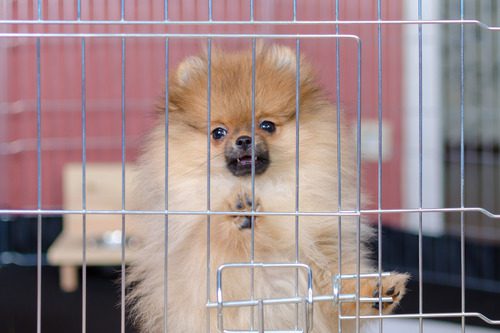How to Stop Kittens from Biting
Introducing a new kitten to your home brings joy and excitement, but it can also come with challenges, especially when it comes to kitten biting. This common behavior, while natural, can be frustrating and sometimes painful. Understanding why kittens bite and knowing how to address it effectively can lead to a happier and safer environment for both you and your feline friend. In this article, we’ll explore practical strategies and tips on how to stop kittens from biting, ensuring a peaceful cohabitation. For more personalized advice, call Brown Veterinary Hospital in Terre Haute, IN, at 812-645-0715.

Understanding Why Kittens Bite
Kittens bite for various reasons, including teething, play, and exploration. It’s essential to recognize these behaviors to address them appropriately. Teething usually occurs between two to six months of age, causing discomfort that leads to chewing and biting. Play-biting is a part of kittens’ natural instinct to hone their hunting skills. Additionally, kittens use their mouths to explore their surroundings, which can result in unintended bites.
Recognizing Teething Behavior
During the teething phase, kittens often chew on anything they can find, including your fingers. Providing appropriate teething toys can help alleviate discomfort and reduce the likelihood of biting. Soft, rubbery toys designed for kittens are ideal for this purpose. Observing your kitten’s behavior and offering suitable alternatives can make a significant difference.
Distinguishing Play-Biting
Play-biting is another common behavior in kittens. It usually involves pouncing, chasing, and mock fighting. While this is a normal part of kitten development, it’s important to redirect their energy toward appropriate toys. Interactive play with toys like feather wands or laser pointers can help satisfy their hunting instincts without involving your hands or feet.
Teaching Gentle Play
Training your kitten to play gently is crucial in curbing biting behavior. Start by establishing clear boundaries and using positive reinforcement techniques. When your kitten bites during play, immediately stop the interaction and ignore them for a few moments. This teaches them that biting ends the fun. Consistency is key to success.
- Using Toys Effectively: Using toys during playtime helps keep your hands and feet out of the equation. Encourage your kitten to chase, pounce, and bat at toys instead. Rotating toys regularly can keep your kitten engaged and interested. Interactive toys that mimic prey movements can be particularly effective in channeling their natural predatory instincts.
- Positive Reinforcement: Rewarding your kitten for gentle play reinforces good behavior. Treats, praise, and petting can be used as rewards when your kitten interacts without biting. Consistently rewarding gentle play helps your kitten understand what is expected of them, making it more likely they will repeat the desired behavior.
Redirecting Unwanted Behavior
When your kitten bites, it’s essential to redirect their attention to something appropriate. This technique helps them learn what is acceptable to bite and what isn’t. Providing a variety of toys and chewable items can help in this redirection process.
Providing Chew Toys
Offering a variety of chew toys can help satisfy your kitten’s urge to bite. Look for toys made from durable materials that can withstand sharp kitten teeth. Chew toys can provide a safe outlet for your kitten’s need to gnaw and can reduce the chances of them biting inappropriate objects or people.
Interactive Play Sessions
Engaging your kitten in regular interactive play sessions can help burn off excess energy and reduce the likelihood of biting. Schedule multiple short play sessions throughout the day to keep your kitten mentally and physically stimulated. Interactive play helps strengthen the bond between you and your kitten while teaching them appropriate play behavior.
Socializing Your Kitten
Proper socialization plays a crucial role in preventing biting behavior. Exposing your kitten to various environments, people, and other pets can help them become well-adjusted adults. Socialization teaches kittens how to interact appropriately and reduces fear-based biting.
- Introducing Your Kitten to New Experiences: Gradually introducing your kitten to new experiences can help them adapt to different situations without resorting to biting. Start with short, positive exposures to new people, pets, and environments. Reward your kitten for calm behavior with treats and praise. Over time, your kitten will learn to navigate new experiences confidently.
- Playdates with Other Kittens: Arranging playdates with other kittens can help teach your kitten appropriate play behavior. Kittens learn from each other through play and social interactions. Supervised playdates provide an opportunity for your kitten to learn bite inhibition and other social skills. Ensure that the play environment is safe and that both kittens are healthy and vaccinated.
Consistency and Patience
Consistency and patience are vital when training your kitten not to bite. It takes time for kittens to learn and adapt to new behaviors. Avoid physical punishment, as it can lead to fear and aggression. Instead, focus on positive reinforcement and gentle redirection.
Setting Clear Boundaries
Establishing clear boundaries helps your kitten understand what is acceptable behavior. Consistently enforce these boundaries with all members of your household. If your kitten bites, everyone should respond in the same way to avoid confusion. Unified responses help reinforce the training and make it easier for your kitten to learn.
Maintaining Patience
Training a kitten requires patience and persistence. Understand that biting is a natural behavior, and it will take time for your kitten to learn the appropriate way to interact. Celebrate small victories and remain consistent in your training efforts. Over time, your kitten will develop better habits.
When to Seek Professional Help
If your kitten’s biting behavior persists despite your best efforts, it may be time to seek professional help. A veterinarian or animal behaviorist can provide additional guidance and support. They can help identify underlying issues and develop a tailored plan to address your kitten’s specific needs.
- Consulting a Veterinarian: A veterinarian can rule out any medical causes for your kitten’s biting behavior. Pain or discomfort can sometimes lead to increased biting. Regular check-ups ensure your kitten is healthy and can help address any underlying health issues that may contribute to biting.
- Working with an Animal Behaviorist: An animal behaviorist specializes in understanding and modifying animal behavior. They can provide expert advice and create a customized training plan for your kitten. Working with a professional can be especially helpful for addressing more challenging behaviors and ensuring long-term success.
Ensuring a Gentle and Happy Kitten
Training your kitten to stop biting requires understanding, patience, and consistency. By recognizing the reasons behind the behavior and using positive reinforcement techniques, you can teach your kitten to interact gently. Providing appropriate toys, socializing your kitten, and maintaining clear boundaries are all essential steps in this process. If needed, don’t hesitate to seek professional help. For more personalized advice on how to stop kittens from biting, call Brown Veterinary Hospital in Terre Haute, IN, at 812-645-0715. Together, we can ensure your kitten grows into a well-mannered and loving companion.
Recent Posts
About Brown Veterinary Hospital
We are here to serve as your partner in keeping your four-legged family member healthy, ensuring you have all the tools you need to provide them with a lifetime of outstanding care. Our animal hospital in Terre Haute offers a full range of services to nurture and extend your pet’s life, from wellness and preventative care to critical care, exotic pet care, and dermatology.





